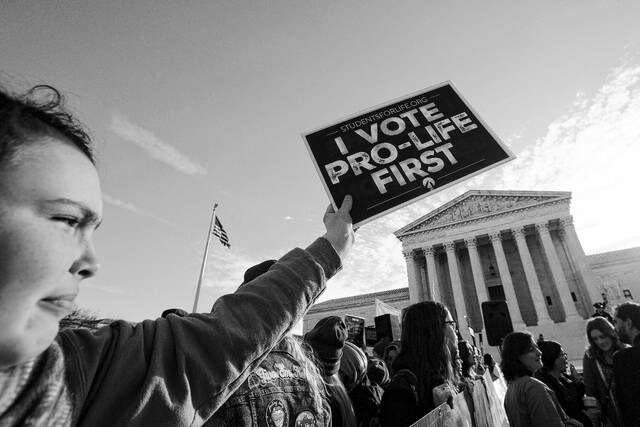
Anti-abortion demonstrators rally outside the U.S. Supreme Court in Washington, D.C. in this file photo.
AP file photo
Click here to subscribe today or Login.
The arguments against abortion are powerful — viscerally and logically. If conception is not the start of life, what is? If science consistently pushes the date a premature baby can live to a shorter point in gestation, how can we justify picking a number of weeks at which a fetus is not viable?
The arguments for a woman’s right to choose are just as powerful.
And, at least two U.S. Supreme Court Justices appointed by the former president said during confirmation hearings that Roe V. Wade was settled law. Did they lie to assure their appointment so they could overturn it? Or did they parse their words to tacitly acknowledge all Supreme Court decisions are settled law until the Supreme Court reverses a decision?
Then there is the fact that polls consistently show an overwhelming majority of Americans support the right to abortion to some extent. Was the will of that majority thwarted by political maneuvering? A Republican-controlled senate refused to take action on one Democratic Supreme Court nominee for 10 months by claiming the people should get to pick their next president first, then rammed through the appointment of a Republican nominee before people picked a different president four years later. Even if you approve of the outcome, you should consider how you would feel if Democrats did the same thing.
The Supreme Court’s official decision overturning Roe V. Wade on Friday was not a surprise, thanks to the draft opinion leaked months ago. Still, both that leak and this final ruling propel the abortion conversation to the forefront. And frankly, we as a nation have never had a real discussion about it. We’ve made it the most egregious of political footballs. But a thorough national exchange? That’s not possible when the two sides dig in so deep.
Questions about a woman’s rights to her own health decision weigh very heavily in this matter, and the court’s ruling could prove a dangerous precedent, as critics have warned. The conservative justices have, in three consecutive rulings, upended decades of laws: ruling Maine must provide public money to religious schools under certain circumstances, declaring New York State’s long-standing concealed gun laws unconstitutional and now overturning Roe. There are legitimate questions about just how invasive this court is willing to get, both into state and personal rights.
But we offer a different starting point for the renewed debate about abortion: Who will take care of the infants women are forced to birth?
If a mother can’t afford to feed, clothe, shelter or educate her child, will the Supreme Court rule that the federal or state government must provide?
It is reasonable to counter that a woman can avoid a pregnancy if she is not ready. It is also glib. Maybe they were ready, and something beyond their control interfered. Or maybe they took precautions but something failed. Those who want to ban abortion, like those who want to preserve it, don’t know each circumstance.
But it is simpler than that. A government — the people — demanded the baby be born. He or she will be here. He or she will deserve every opportunity to thrive.
Are we as a society willing to assure that happens? Will we pay more taxes to provide medical care, food, opportunities? Will we tax the rich more heavily to do what’s right by every child? Will we increase corporate taxes? Will we establish universal health care for parents and their children?
Do we collectively have the right to ban abortions without collectively taking on the responsibility for every child born?
The answer in the United States, sadly, has always been no.
You want to take away a woman’s right to abortion and then abandon that forced birth to the whims of the newborn’s circumstances?
That’s the real debate.
– Times Leader




